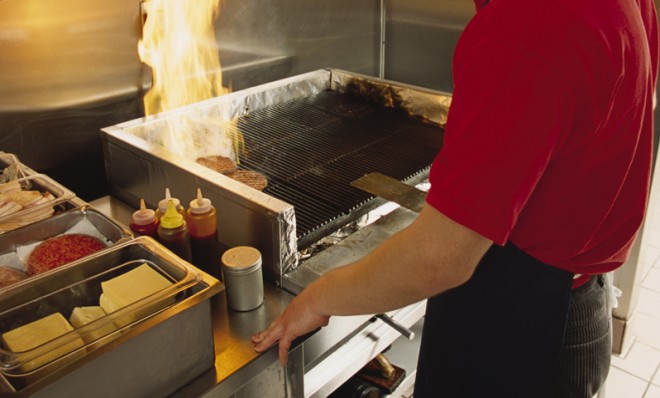5 top execs who started on the sales floor, flipping burgers, or picking up trash
Sometimes in business, patience pays off

A free daily email with the biggest news stories of the day – and the best features from TheWeek.com
You are now subscribed
Your newsletter sign-up was successful
1. Lyle G. Heidemann: From janitor at Sears to CEO of True Value Hardware
Lyle G. Heidemann, CEO of True Value Hardware, worked his way through college as a part-time janitor at a Sears Roebuck and Co. in Illinois. Upon graduating in 1967, Heidemann decided to stick with with the company, and started his climb — first managing the paint and electrical department in Kankakee, Ill., then slowly running larger and larger operating units until 1996, when Sears hired him as divisional vice president and general manager of lawn & garden and sporting goods (imagine putting that on your business card). From there, he bounced around the executive ranks until retiring in 2003. Then in 2005, when Heidemann was 60, True Value pulled him away from golf and travel to be president and CEO of the hardware store chain. At the time, board chairman Bryan Ableidinger, himself the owner of a hardware store, said Heidemann "has walked a mile in our moccasins."
2. Mike Pratt: From the sales floor at Future Shop to CEO of Guitar Center
The Week
Escape your echo chamber. Get the facts behind the news, plus analysis from multiple perspectives.

Sign up for The Week's Free Newsletters
From our morning news briefing to a weekly Good News Newsletter, get the best of The Week delivered directly to your inbox.
From our morning news briefing to a weekly Good News Newsletter, get the best of The Week delivered directly to your inbox.
In 1990, Future Shop, Canada's largest electronics retailer, hired recent college grad Mike Pratt to work the sales floor. Like Heidemann, Pratt stayed put, using the next decade to rise through the management ranks. By 2001, when Best Buy bought Future Shop for $580 million, the retailer chose Pratt, then just 31, to be senior vice president of operations of Best Buy Canada. Pratt kept climbing from there, and in 2008, was named president. Over his tenure, Pratt grew the company from from 165 to 275 stores, and grew its e-commerce activities and web presence — big moves that caught the eye of Bain Capital, which poached Pratt this year to be CEO of Guitar Center.
3. Shawn Score: From the sales floor at Best Buy to Senior V.P. of U.S. retail at Best Buy
Earlier this year, The Wall Street Journal ran a photo of Shawn Score under the headline "Can This Former Clerk Save Best Buy?" That's the task Score, who started out selling VCRs and Camcorders at a Best Buy in North Dakota, is now faced with. Having worked his way up to senior V.P. of U.S. retail, Score is charged with reinvigorating customer service at the 800-plus store company. Score says he's using lessons he learned as a salesperson — like the importance of educating sales people about the products and providing incentive pay — to boost customer satisfaction and drive sales. So far it's working: For the quarter ending February 2, Best Buy announced it cut losses to $409 million, compared with $1.82 billion a year earlier.
4. Stuart Rose: From pajama salesman at Marks & Spencer to CEO at Marks & Spencer (and British Knight)
A free daily email with the biggest news stories of the day – and the best features from TheWeek.com
Now one of the U.K.'s most legendary businessmen, Stuart Rose started his career in 1972 selling pajamas on the sales floor of Marks & Spencer. Rose stayed with the company until 1989, when he left to run Burton Group. Over the next decade he jumped around, making a name for himself negotiating takeover bids, overseeing mergers, and revitalizing sales at troubled companies. Finally in 2004, 15 years after his departure, Rose returned to Marks & Spencer, where he fought off several hostile takeovers, was named the "2006 Business Leader of the Year" by the World Leadership Forum, and was knighted by the Queen of England. "People today try and go down a conventional route," he told the BBC. "More importantly, and more erroneously, they try and plan their careers to the nth degree," which can leave them "very bitter and twisted when they don't make it."
5. Fred Turner: From burger-flipper at McDonald's to chairman of McDonald's
Probably the most famous register-to-corner-office story is that of Fred Turner, the legendary head of McDonald's. Starting as a grill operator in 1956 when McDonald's had just 34 employees, Turner flew through the ranks. By 1958 he was named operations vice president, where he made his stamp by tightening the rules for how food was produced. Under Turner's eye, for example, every french fry had to be exactly .28 inches thick. By 1967, he rose to executive VP, then in 1968, president. Just a decade later, in 1977, Turner replaced McDonald's founder Ray Kroc as chairman, where he stayed for the remainder of his career, overseeing growth of 31,000 stores into 118 countries. By the time he retired in 2004, Turner had overseen the sale of over one billion hamburgers.
Carmel Lobello is the business editor at TheWeek.com. Previously, she was an editor at DeathandTaxesMag.com.


